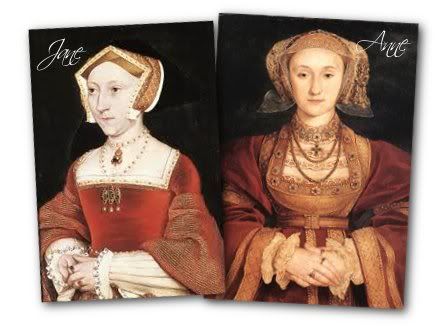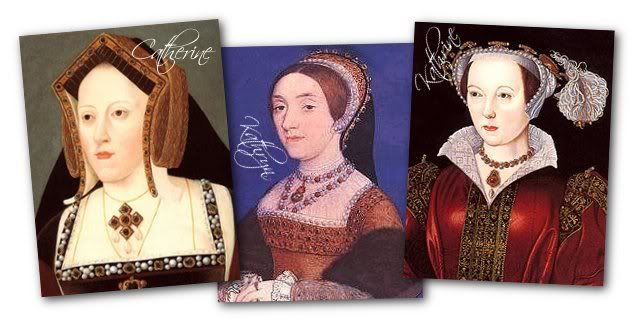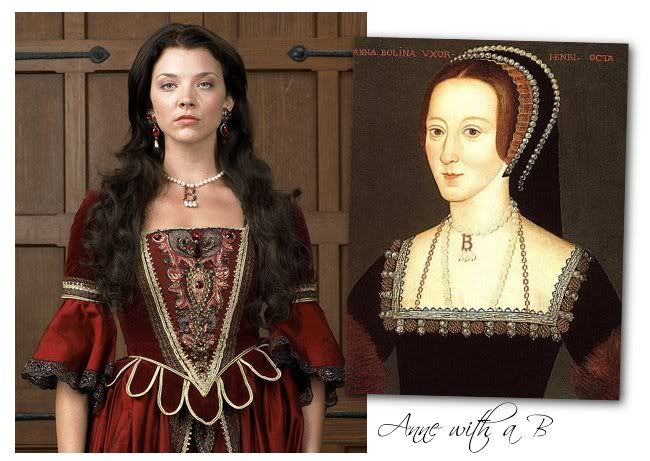 Of course Henry’s portrayed as an over-sexed, spoiled egomaniac, and certainly this characterization couldn’t have been far from the mark. He’s reincarnated in the body of Jonathan Rhys Meyers, in whose steely stare seems to lie the seat of evil itself. They couldn’t have cast a better Henry. He’s terrifying, childlike, and explosive, all wrapped into one.
Of course Henry’s portrayed as an over-sexed, spoiled egomaniac, and certainly this characterization couldn’t have been far from the mark. He’s reincarnated in the body of Jonathan Rhys Meyers, in whose steely stare seems to lie the seat of evil itself. They couldn’t have cast a better Henry. He’s terrifying, childlike, and explosive, all wrapped into one.I’ve always been fascinated by Elizabeth I, which in turn led me to be interested in her mother Anne Boleyn, the second, unfortunate wife of King Henry. She faced a terrible fate, after waiting so long for the crown and being despised by a people who weren’t yet used to the revolving door that would become the queens throne. To keep them all straight, you’ll remember from your high school history class, the helpful couplet:
Divorced, Beheaded, Died.
Divorced, Beheaded, Survived.
Anne was the first to lose her head at the King’s displeasure—well, at least the first of his wives, rather. This dysfunctional family story has been given a lot of attention in the fictional world. I think it captures the imagination because it seems impossible to think how a man could go from loving a woman enough to marry her (although I suppose that’s debatable) to killing her off in just a few short years. And since Anne was the first home-wrecker, she seems to attract most of the attention. Anne was there before Henry’s I-do-I-don’t pattern was established. For all she knew, she was the next and the last wife. I can’t think she could have imagined that she could be cast aside and become one of many.
Years ago, I read The Other Boleyn Girl (it was made into a movie with Scarlett Johansen and Natalie Portman), and it was just okay for me. Anne was accused of treason, adultery, and incest (with her brother George), but who knows if these charges were legitimate. Most seem to think not, but this book made believe as if they were. Which seems interesting since Henry divorced Catherine of Aragon on the argument that since she had been his brother’s wife, their marriage was unlawful. And Henry, with his never ending string of mistresses, had picked out Anne’s sister Mary before he become interested in Anne.
After he disposed of Anne, he was free to wed his next interest, whom he had already started dating right in Anne’s face—Jane Seymour, one of Anne’s ladies-in-waiting. She gave Henry his coveted son (although he would never become a true monarch, dying at the age of 15),
 but then she died of complications from the pregnancy. Funny . . . the only wife Henry actually wanted to keep, and he couldn’t have her. Although, who can say what would have happened had she been permitted to live, since Henry’s mood seemed to turn on a dime.
but then she died of complications from the pregnancy. Funny . . . the only wife Henry actually wanted to keep, and he couldn’t have her. Although, who can say what would have happened had she been permitted to live, since Henry’s mood seemed to turn on a dime.And that’s when he really starts running through wives as if they are going out of style. And it seems they were. When the second Anne, of Cleves, was presented to him—a match skillfully and painfully made—he was displeased with her looks and had the marriage annulled as soon as possible. When Henry said he didn’t sleep with her, it was probably the only time it was true. At this point, Henry was also no treat to behold. He’d been injured in several jousting matches, being too proud to admit that he was too old for the sport. Because of his injuries, his legs, Henry’s prized attribute, were literally rotting. Not to mention the fact that he’d taken to drowning his sorrows in the equivalent of Big Macs and KFC for every meal, ballooning himself to massive proportions. Why is it when some men get old and fat and lazy, they think they ought to remain regarded as the 18-year-old versions of themselves? It seems wealth and power can be a combined tonic of a pseudo fountain of youth for some women. Love truly is blind.

Henry took this May-December phenomenon to new heights. His last wife’s parents actually named her after Henry’s first queen, Catherine of Aragon, and she was to be the third C/Katheri(y)ne he married. I wonder if he ever got them mixed up, like children whose names begin with a similar sound.
I must wonder at how these women are portrayed, particularly Anne Boleyn. She’s a headstrong, outspoken, stubborn girl, prone to put in her opinion where it is not warranted, about everything including politics, and to fits of rage and jealousy at her husband’s affairs. She’s careless and spoiled, only pleading for forgiveness when her nature has bested her again, often provoking the wrath of the king. Maybe he would have overlooked all this, but when Anne gave birth to a healthy girl and then couldn’t do the same for her stillborn son, the camel’s back had been broken. There are letters, documents, etc. that can all attest to the truth of these facts.

But I must counter—in a time when idle gossip was taken for fact—can we really be sure of Anne Boleyn’s character? Can we really say anything about her for sure? I suppose we have some evidence, and perhaps she was stubborn by nature, but couldn’t that have been exaggerated? Anne knew of the king’s disposition long before she became his wife. He courted her for six years while she loyally waited for his increasingly difficult divorce to somehow go through. I can’t imagine he was faithful to her all that time, especially when it’s “reported” that they didn’t consummate their relationship until the divorce was imminent. Her own sister was one of his mistresses! And his willingness to spurn a woman to whom he’d been married for over twenty years—that couldn’t have been easy to overlook.
She must have known that Henry’s good graces were thin at best. Would she really have been so careless? Or did the king just get tired of her? Or was he seeing visions of Catherine in those stillbirths that he couldn’t get over? For all we know, Anne could have been obedient and docile, or Henry could have been, being pushed and pulled by his advisors. Can we really say for certain? We’ll most likely never know, but I guess that doesn’t take away the pleasure of supposition. We always want the key to the mystery, to unravel the carefully woven plot. But if we really pulled the curtain and saw the magician’s tricks, I have a feeling the story would probably seem more ordinary than we care to admit. So, I enjoy the scandal, whether it’s imagined or real. Huzzah!

2 comments:
Ohhh I so love this post! When I took one of my European History classes we spent 3 weeks on Henry and his many wives. I've forgotten most of it now (oops), but I love relearning about it!
i found the tudors too! i had heard of this show a few years ago and knew i wasn't old enough to watch the showtime version. today we got a really bad snow and i holed up in the house and watched 4 or 5 back to back -- so much for my "to do" list. it was wonderful. i had the first 11. if you see that they are showing more after episode 11, let me know. what i find fascinating is that for some of the religious leaders it's not about religion at all but power and money, etc.
Post a Comment